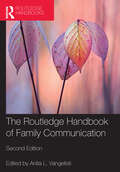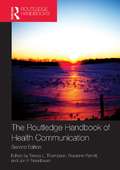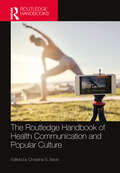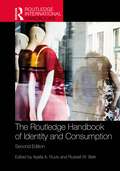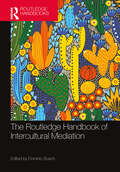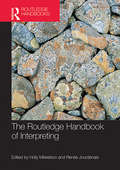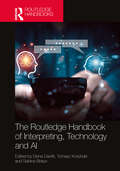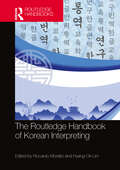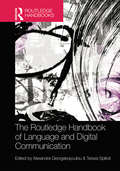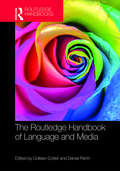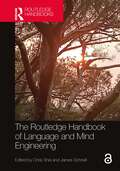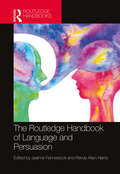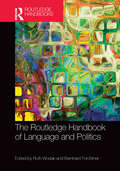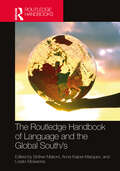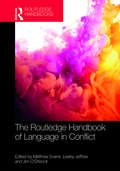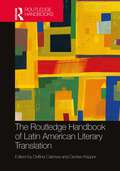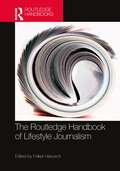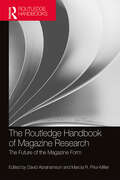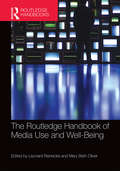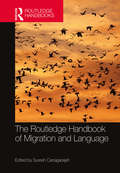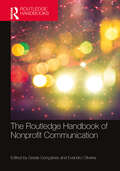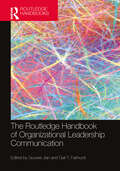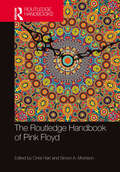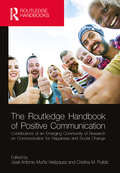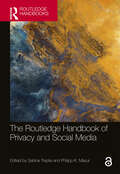- Table View
- List View
The Routledge Handbook of Family Communication (Routledge Communication Series)
by Anita L. VangelistiWith a synthesis of research on issues key to understanding family interaction, as well as an analysis of many theoretical and methodological choices made by researchers studying family communication, the Handbook serves to advance the field by reframing old questions and stimulating new ones. The contents are comprised of chapters covering: theoretical and methodological issues influencing current conceptions of family; research and theory centering around the family life course communication occurring in a variety of family forms individual family members and their relationships dynamic communication processes taking place in families family communication embedded in social, cultural, and physical contexts. Key changes to the second edition include: updates throughout, providing a thorough and up-to-date overview of research and theory new topics reflecting the growth of the discipline, including chapters on "singles" as family members, emerging adults, and physiology and physical health. Highlighting the work of scholars across disciplines--communication, social psychology, clinical psychology, sociology, family studies, and others--this volume captures the breadth and depth of research on family communication and family relationships. The well-known contributors approach family interaction from a variety of theoretical perspectives and focus on topics ranging from the influence of structural characteristics on family relationships to the importance of specific communication processes.
The Routledge Handbook of Health Communication (Routledge Communication Series)
by Teresa L. Thompson Jon F. Nussbaum Roxanne ParrottThe Routledge Handbook of Health Communication brings together the current body of scholarly work in health communication. With its expansive scope, it offers an introduction for those new to this area, summarizes work for those already learned in the area, and suggests avenues for future research on the relationships between communicative processes and health/health care delivery. This second edition of the Handbook has been organized to reflect the goals of health communication: understanding to make informed decisions and to promote formal and informal systems of care linked to health and well-being. It emphasizes work in such areas as barriers to disclosure in family conversations and medical interactions, access to popular media and advertising, and individual searches online for information and support to guide decisions and behaviors with health consequences. This edition also adds an overview of methods used in health communication and the unique challenges facing health communication researchers applying traditional methods to efforts to gain reliable and valid evidence about the role of communication for health. It introduces the promise of translational research being conducted by health communication researchers from multiple disciplines to form transdisciplinary theories and teams to increase the well-being of not only humans but the systems of care within their nations. Arguably the most comprehensive scholarly resource available for study in this area, the Routledge Handbook of Health Communication serves an invaluable role and reference for students, researchers, and scholars doing work in health communication.
The Routledge Handbook of Health Communication and Popular Culture (Routledge Handbooks in Communication Studies)
by Christina S. BeckThe Routledge Handbook of Health Communication and Popular Culture offers rich insights into the ways in which communication about health through popular culture can become a part of healing, wellness, and health-related decisions.This Handbook allows readers to understand and consider messages that inform and influence health-related choices through pop culture in the public sphere. Written in an accessible narrative style and including interdisciplinary, global, and diverse perspectives, a vast team of contributing authors from the field explores the intersections between health communication and popular culture. The Handbook is divided into five parts: Framing of Health-Related Issues in Popular Culture; Exploring Popular Culture Influences on Health Behaviors and Beliefs; Considering Pro-Social Public Health Interventions in Popular Culture; Understanding Health Issues in Popular Culture from Diverse Perspectives; and Pop Culture and Health Communication: Looks to the Future.The Handbook will be of interest to students and scholars in the fields of Communication Studies, Health Communication, Public Health Policy, Media Literacy, and Cultural Studies.
The Routledge Handbook of Identity and Consumption (Routledge International Handbooks)
by Russell W. Belk Ayalla A. Ruvio"Tell me what you eat, I'll tell you who you are," said Anthelme Brillat-Savarin. Today, "You are what you consume" is more apt. Barbara Krueger’s ironic twist of Descartes – "I shop therefore I am" – has lost its irony. Such phrases have become commonplace descriptions of our identity in the contemporary world. In our materialistic world, it seems as if there is no debate that our consumption behavior is fused with our self-identity – shaping it, changing it, and often challenging it.The Routledge Handbook of Identity and Consumption introduces the reader to state-of-the-art research, written by the world’s leading scholars regarding the interplay between identity and consumption. The book addresses the diverse issues regarding the ways identity affects our consumption behaviour and vice-versa and in doing so presents a broad perspective on the dynamics of self-identity and consumption.With chapters discussing the theory, research, and practical implications of these dynamics, including the way they change across our life span and their expression within different social, cultural, and religious contexts, this book will be a valuable reference source for students and academics from a variety of disciplines.
The Routledge Handbook of Intercultural Mediation (Routledge Handbooks in Communication Studies)
by Dominic BuschOffering unique coverage of an emerging, interdisciplinary area, this comprehensive handbook examines the theoretical underpinnings and emergent conceptions of intercultural mediation in related fields of study. Authored by global experts in fields from intercultural communication and conflict resolution to translation studies, literature, political science, and foreign language teaching, chapters trace the history, development, and present state of approaches to intercultural mediation. The sections in this volume show how the concept of intercultural mediation has been constructed among different fields and shaped by its specific applications in an open cycle of influence. The book parses different philosophical conceptions as well as pragmatic approaches, providing ample grounding in the key perspectives on this growing field of discourse. The Routledge Handbook of Intercultural Mediation is a valuable reference for graduate and postgraduate students studying mediation, conflict resolution, intercultural communication, translation, and psychology, as well as for practitioners and researchers in those fields and beyond.
The Routledge Handbook of Interpreting (Routledge Handbooks in Applied Linguistics)
by Holly Mikkelson Renée JourdenaisThe Routledge Handbook of Interpreting provides a comprehensive survey of the field of interpreting for a global readership. The handbook includes an introduction and four sections with thirty one chapters by leading international contributors. The four sections cover: The history and evolution of the field The core areas of interpreting studies from conference interpreting to interpreting in conflict zones and voiceover Current issues and debates from ethics and the role of the interpreter to the impact of globalization A look to the future Suggestions for further reading are provided with every chapter. The Routledge Handbook of Interpreting is an essential reference for researchers and advanced students of interpreting.
The Routledge Handbook of Interpreting, Technology and AI (Routledge Handbooks in Translation and Interpreting Studies)
by Sabine Braun Elena Davitti Tomasz KorybskiThis handbook provides a comprehensive overview of the history, development, use, and study of the evolving relationship between interpreting and technology, addressing the challenges and opportunities brought by advances in AI and digital tools.Encompassing a variety of methods, systems, and devices applied to interpreting as a field of practice as well as a study discipline, this volume presents a synthesis of current thinking on the topic and an understanding of how technology alters, shapes, and enables the interpreting task. The handbook examines how interpreting has evolved through the integration of both purpose-built and adapted technologies that support, automate, or even replace (human) interpreting tasks and offers insights into their ethical, practical, and socio-economic implications. Addressing both signed and spoken language interpreting technologies, as well as technologies for language access and media accessibility, the book draws together expertise from varied areas of study and illustrates overlapping aspects of research.Authored by a range of practicing interpreters and academics from across five continents, this is the essential guide to interpreting and technology for both advanced students and researchers of interpreting and professional interpreters.
The Routledge Handbook of Korean Interpreting (Routledge Handbooks in Translation and Interpreting Studies)
by Riccardo Moratto Hyang-Ok LimProfessor Riccardo Moratto and Professor Hyang-Ok Lim bring together the most authoritative voices on Korean interpreting. The first graduate school of interpretation and translation was established in 1979 in South Korea. Since then, not only has the interpretation and translation market grown exponentially, but so too has research in translation studies. Though the major portion of research focuses on translation, interpretation has not only managed to hold its own, but interpretation studies in Korea have been a pioneer in this field in Asia. This handbook highlights the main interpretation research trends in South Korea today, including case studies of remote interpreting during the Covid-19 pandemic, Korean interpreting for conferences, events, and diplomacy, and research into educating interpreters effectively. An essential resource for researchers in Korean interpreting, this handbook will also be very valuable to those working with other East Asian languages.
The Routledge Handbook of Language and Digital Communication (Routledge Handbooks in Applied Linguistics)
by Alexandra Georgakopoulou Tereza SpiliotiThe Routledge Handbook of Language and Digital Communication provides a comprehensive, state of the art overview of language-focused research on digital communication, taking stock and registering the latest trends that set the agenda for future developments in this thriving and fast moving field. The contributors are all leading figures or established authorities in their areas, covering a wide range of topics and concerns in the following seven sections: • Methods and Perspectives; • Language Resources, Genres, and Discourses; • Digital Literacies; • Digital Communication in Public; • Digital Selves and Online-Offline Lives; • Communities, Networks, Relationships; • New debates and Further directions. This volume showcases critical syntheses of the established literature on key topics and issues and, at the same time, reflects upon and engages with cutting edge research and new directions for study (as emerging within social media). A wide range of languages are represented, from Japanese, Greek, German and Scandinavian languages, to computer-mediated Arabic, Chinese and African languages. The Routledge Handbook of Language and Digital Communication will be an essential resource for advanced undergraduates, postgraduates and researchers within English language and linguistics, applied linguistics and media and communication studies.
The Routledge Handbook of Language and Media
by Colleen Cotter Daniel PerrinThe Routledge Handbook of Language and Media provides an accessible and comprehensive overview of state-of-the-art research in media linguistics. This handbook analyzes both language theory and practice, demonstrating the vital role of this research in understanding language use in society. With over thirty chapters contributed by leading academics from around the world, this handbook: addresses issues of language use, form, structure, ideology, practice, and culture in the context of both traditional and new communication media; investigates mediated language use in public spheres, organizations, and personal communication, including newspaper journalism, broadcasting, and social media; examines the interplay of language and media from both linguistic and media perspectives, discussing auditory and visual media and graphic modes, as well as language and gender, multilingualism, and language change; analyzes the advantages and shortcomings of current approaches within media linguistics research and outlines avenues for future research. The Routledge Handbook of Language and Media is a must-have survey of this key field, and is essential reading for those interested in media linguistics.
The Routledge Handbook of Language and Mind Engineering
by Chris Shei James SchnellThe Routledge Handbook of Language and Mind Engineering is a comprehensive work that delves into the complex interplay between language, culture, politics, and media in shaping the human mind.The book is divided into five main sections, each exploring different aspects of mind engineering: I. Political Mind Engineering; II. Commercial Mind Engineering; III. Media, Culture, and Mind Engineering; IV. Linguistic and Semiotic Analysis of Mind Engineering; V. Mind Engineering in Educational Settings.The book provides a multi-dimensional perspective on how language, media, culture, and politics intersect to shape individuals' thoughts and beliefs. It highlights the diverse methods and contexts in which mind engineering occurs, making it a valuable resource for scholars, researchers, and policymakers interested in understanding the complexities of contemporary discourse and manipulation of human thought.The contents of this cutting-edge handbook will engage all undergraduate, postgraduate, PhD students and scholars, and researchers at all levels, in fields such as languages, linguistics, politics, communication studies, media studies, and psychology.Chapter 15 of this book is freely available as a downloadable Open Access PDF at http://www.taylorfrancis.com under a Creative Commons Attribution (CC-BY) International license.Chapter 17 of this book is freely available as a downloadable Open Access PDF at http://www.taylorfrancis.com under a Creative Commons Attribution‑Non Commercial‑No Derivatives (CC‑BY‑NC‑ND) 4.0 license.Chapter 18 of this book is freely available as a downloadable Open Access PDF at http://www.taylorfrancis.com under a Creative Commons Attribution-Non Commercial-No Derivatives (CC-BY-NC-ND) 4.0 license.
The Routledge Handbook of Language and Persuasion (Routledge Handbooks in Linguistics)
by Randy Allen Harris Jeanne FahnestockThis handbook provides a wide-ranging, authoritative, and cutting-edge overview of language and persuasion. Featuring a range of international contributors, the handbook outlines the basic materials of linguistic persuasion – sound, words, syntax, and discourse – and the rhetorical basics that they enable, such as appeals, argument schemes, arrangement strategies, and accommodation devices. After a comprehensive introduction that brings together the elements of linguistics and the vectors of rhetoric, the handbook is divided into six parts. Part I covers the basic rhetorical appeals to character, the emotions, argument schemes, and types of issues that constitute persuasion. Part II covers the enduring effects of persuasive language, from humor to polarization, while a special group of chapters in Part III examines figures of speech and their rhetorical uses. In Part IV, contributors focus on different fields and genres of argument as entry points for research into conventions of arguing. Part V examines the evolutionary and developmental roots of persuasive language, and Part VI highlights new computational methods of language analysis. This handbook is essential reading for those researching and studying persuasive language in the fields of linguistics, rhetoric, argumentation, communication, discourse studies, political science, psychology, digital studies, mass media, and journalism.
The Routledge Handbook of Language and Politics (Routledge Handbooks in Linguistics)
by Ruth Wodak and Bernhard ForchtnerThe Routledge Handbook of Language and Politics provides a comprehensive overview of this important and dynamic area of study and research. Language is indispensable to initiating, justifying, legitimatising and coordinating action as well as negotiating conflict and, as such, is intrinsically linked to the area of politics. With 45 chapters written by leading scholars from around the world, this Handbook covers the following key areas: Overviews of the most influential theoretical approaches, including Bourdieu, Foucault, Habermas and Marx; Methodological approaches to language and politics, covering – among others – content analysis, conversation analysis, multimodal analysis and narrative analysis; Genres of political action from speech-making and policy to national anthems and billboards; Cutting-edge case studies about hot-topic socio-political phenomena, such as ageing, social class, gendered politics and populism. The Routledge Handbook of Language and Politics is a vibrant survey of this key field and is essential reading for advanced students and researchers studying language and politics.
The Routledge Handbook of Language and the Global South/s (Routledge Handbooks in Applied Linguistics)
by Sinfree Makoni Anna Kaiper-Marquez Lorato MokwenaThis Handbook centers on language(s) in the Global South/s and the many ways in which both "language" and the "Global South" are conceptualized, theorized, practiced, and reshaped. Drawing on 31 chapters situated in diverse geographical contexts, and four additional interviews with leading scholars, this text showcases: Issues of decolonization Promotion of Southern epistemologies and theories of the Global South/s A focus on social/applied linguistics An added focus on the academy A nuanced understanding of global language scholarship. It is written for emerging and established scholars across the globe as it positions Southern epistemologies, language scholarship, and decolonial theories into scholarship surrounding multiple themes and global perspectives.
The Routledge Handbook of Language in Conflict (Routledge Handbooks in Applied Linguistics)
by Lesley Jeffries Matthew Evans Jim O'DriscollThe Routledge Handbook of Language in Conflict presents a range of linguistic approaches as a means for examining the nature of communication related to conflict. Divided into four sections, the Handbook critically examines text, interaction, languages and applications of linguistics in situations of conflict. Spanning 30 chapters by a variety of international scholars, this Handbook: includes real-life case studies of conflict and covers conflicts from a wide range of geographical locations at every scale of involvement (from the personal to the international), of every timespan (from the fleeting to the decades-long) and of varying levels of intensity (from the barely articulated to the overtly hostile) sets out the textual and interactional ways in which conflict is engendered and in which people and groups of people can be set against each other considers what linguistic research has brought, and can bring, to the universal aim of minimising the negative effects of outbreaks of conflict wherever and whenever they occur. The Routledge Handbook of Language in Conflict is an essential reference book for students and researchers of language and communication, linguistics, peace studies, international relations and conflict studies.
The Routledge Handbook of Latin American Literary Translation (Routledge Handbooks in Translation and Interpreting Studies)
by Denise Kripper Delfina CabreraThe Routledge Handbook of Latin American Literary Translation offers an understanding of translation in Latin America both at a regional and transnational scale. Broad in scope, it is devoted primarily to thinking comprehensively and systematically about the intersection of literary translation and Latin American literature, with a curated selection of original essays that critically engage with translation theories and practices outside of hegemonic Anglo centers. In this introductory volume, through survey and case-study chapters, contributing authors cover literary and cultural translation in the region historically, geographically, and linguistically. From the nineteenth to the twenty-first century, the chapters focus on issues ranging from the role of translation in the construction of national identities to the challenges of translation in the current digital age. Areas of interest expand from the United States to the Southern Cone, including the Caribbean and Brazil, as well as the impact of Latin American literature internationally, and paying attention to translation from and to indigenous languages; Portuguese, English, French, German, Chinese, Spanglish, and more. The first of its kind in English, this Handbook will shed light on different translation approaches and invite a rethinking of intercultural and interlingual exchanges from Latin American viewpoints. This is key reading for all scholars, researchers, and students of literary translation studies, Latin American literature, and comparative literature.
The Routledge Handbook of Lifestyle Journalism (Routledge Media and Cultural Studies Handbooks)
by John Hartley Sarah Lonsdale Folker Hanusch Elfriede Fürsich Stephanie Alice Baker Carsten Stage Rob Sharp Renita Coleman Agnès Rocamora Geoffrey Craig Myles Ethan Lascity Lucia Vodanovic Johana Kotišová Sumana Kasturi Ben Cocking Bethany Usher Peter English Joy Jenkins Nete Nørgaard Kristensen Unni From Maarit Jaakkola Tisha Dejmanee Gregory P. Perreault Elizabeth Fakazis Avery E. Holton Anuja Premika Daniel Nölleke Sandra Banjac Annik Dubied David Fleischman Ella Hackett Aly Hill Phoebe Maares Nhamo Anthony Mhiripiri Nilüfer Türksoy Mariah L. WellmanTaking stock of research in an area that has long been starved of scholarly attention, The Routledge Handbook of Lifestyle Journalism brings together scholars from across journalism, communication, and media studies to offer the first substantial volume of its kind in this dynamic field.This Handbook is divided into five major sections covering definitions; current trends; the relationship between lifestyle journalism and consumer culture; how lifestyle journalism interacts with matters of identity, emotion, politics, and society; and future directions. Featuring 30 contributions from authors at the cutting-edge of research around the world, each chapter provides an authoritative overview of key literature and debates and proposes a way forward for future scholarship.The Routledge Handbook of Lifestyle Journalism is an essential companion for advanced students and researchers of lifestyle journalism and related beats including food, fashion, and travel writing.
The Routledge Handbook of Magazine Research: The Future of the Magazine Form (Routledge Media and Cultural Studies Handbooks)
by David Abrahamson and Marcia R. Prior-MillerScholarly engagement with the magazine form has, in the last two decades, produced a substantial amount of valuable research. Authored by leading academic authorities in the study of magazines, the chapters in The Routledge Handbook of Magazine Research not only create an architecture to organize and archive the developing field of magazine research, but also suggest new avenues of future investigation. Each of 33 chapters surveys the last 20 years of scholarship in its subject area, identifying the major research themes, theoretical developments and interpretive breakthroughs. Exploration of the digital challenges and opportunities which currently face the magazine world are woven throughout, offering readers a deeper understanding of the magazine form, as well as of the sociocultural realities it both mirrors and influences. The book includes six sections: -Methodologies and structures presents theories and models for magazine research in an evolving, global context. -Magazine publishing: the people and the work introduces the roles and practices of those involved in the editorial and business sides of magazine publishing. -Magazines as textual communication surveys the field of contemporary magazines across a range of theoretical perspectives, subjects, genre and format questions. -Magazines as visual communication explores cover design, photography, illustrations and interactivity. -Pedagogical and curricular perspectives offers insights on undergraduate and graduate teaching topics in magazine research. -The future of the magazine form speculates on the changing nature of magazine research via its environmental effects, audience, and transforming platforms.
The Routledge Handbook of Media Use and Well-Being: International Perspectives on Theory and Research on Positive Media Effects
by Mary Beth Oliver Leonard ReineckeThe Routledge Handbook of Media Use and Well-Being serves as the first international review of the current state of this fast-developing area of research. The volume provides a multifaceted perspective on the beneficial as well as the detrimental effects of media exposure on psychological health and well-being. As a "first-mover," it will define the field of media use and well-being and provide an essential resource for research and teaching in this area. The volume is structured along four central considerations: Processes presents concepts that provide a theoretical bridge between media use and well-being, such as psychological need satisfaction, recovery from stress and strain, self-presentation and self-enhancement, or parasocial interactions with media characters, providing a comprehensive understanding of the underlying processes that drive psychological health and well-being through media. Moderators examines both risk factors that promote negative effects on well-being and protective factors that foster positive media effects. Contexts bridges the gap between theory and "real life" by illustrating how media use can influence well-being and satisfaction in very different life domains, covering the full spectrum of everyday life by addressing the public, private, and work spheres. Audiences takes a look at the influence of life phases and life situations on the interplay of media use and well-being, questioning whether various user groups differ with regard to the effects of media exposure. Bringing together the expertise of outstanding international scholars from multiple disciplines, including communication, media psychology, social psychology, clinical psychology, and media education, this handbook sheds new light on the role of media in influencing and affecting emotions.
The Routledge Handbook of Migration and Language (Routledge Handbooks in Applied Linguistics)
by Suresh Canagarajah** Winner of AAAL Book Award 2020 ** **Shortlisted for the BAAL Book Prize 2018** The Routledge Handbook of Migration and Language is the first comprehensive survey of this area, exploring language and human mobility in today’s globalised world. This key reference brings together a range of interdisciplinary and multidisciplinary perspectives, drawing on subjects such as migration studies, geography, philosophy, sociology and anthropology. Featuring over 30 chapters written by leading experts from around the world, this book: Examines how basic constructs such as community, place, language, diversity, identity, nation-state, and social stratification are being retheorized in the context of human mobility; Analyses the impact of the ‘mobility turn’ on language use, including the parallel ‘multilingual turn’ and translanguaging; Discusses the migration of skilled and unskilled workers, different forms of displacement, and new superdiverse and diaspora communities; Explores new research orientations and methodologies, such as mobile and participatory research, multi-sited ethnography, and the mixing of research methods; Investigates the place of language in citizenship, educational policies, employment and social services. The Routledge Handbook of Migration and Language is essential reading for those with an interest in migration studies, language policy, sociolinguistic research and development studies.
The Routledge Handbook of Nonprofit Communication (Routledge Handbooks in Communication Studies)
by Evandro Oliveira Gisela GonçalvesThis handbook brings together multidisciplinary and internationally diverse contributors to provide an overview of theory, research, and practice in the nonprofit and nongovernmental organization (NGO) communication field. It is structured in four main parts: the first introduces metatheoretical and multidisciplinary approaches to the nonprofit sector; the second offers distinctive structural approaches to communication and their models of reputation, marketing, and communication management; the third focuses on nonprofit organizations’ strategic communications, strategies, and discourses; and the fourth assembles campaigns and case studies of different areas of practice, causes, and geographies. The handbook is essential reading for scholars, educators, and advanced students in nonprofit and NGO communication within public relations and strategic communication, organizational communication, sociology, management, economics, marketing, and political science, as well as a useful reference for leaders and communication professionals in the nonprofit sector.
The Routledge Handbook of Organizational Leadership Communication (Routledge Handbooks in Communication Studies)
by Gail T. Fairhurst Guowei JianThis handbook captures a rapidly developing body of scholarship to map out the terrain of leadership communication and stimulate interdisciplinary dialogue among leadership communication scholars for future research. The Routledge Handbook of Organizational Leadership Communication surveys various areas of leadership communication, critically assesses their development, and proposes guidance for future research. It begins by addressing prominent theories or emerging theoretical perspectives that help conceptualize leadership communication, ranging from collective leadership approaches and critical perspectives to theories of practice and communicative constitution of organization. The second section focuses on reviewing the latest research on leadership communication in various organizational contexts, such as work teams, hybrid and virtual work contexts, and interorganizational collaboration. Informed by diverse theoretical perspectives, chapters in the final section examine the practice of leadership communication in dealing with both common and novel organizing challenges and processes, for example, the formation and execution of organizational vision and strategies, the use of emerging media technologies, and organizational decision making.The handbook will be an indispensable resource for researchers and advanced students in leadership communication and leadership studies and practicing managers and consultants in leadership and communication training and development.
The Routledge Handbook of Pink Floyd (Routledge Music Handbooks)
by Chris Hart Simon A. MorrisonThe Routledge Handbook of Pink Floyd is intended for scholars and researchers of popular music, as well as music industry professionals and fans of the band. It brings together international researchers to assess, evaluate and reformulate approaches to the critical study and interpretation of one of the world’s most important and successful bands. For the first time, this Handbook will ‘tear down the wall,’ examining the band’s collective artistic creations and the influence of social, technological, commercial and political environments over several decades on their work. Divided into five parts, the book provides a thoroughly contextualised overview of the musical works of Pink Floyd, including coverage of performance and sound; media, reception and fandom; genre; periods of Pink Floyd’s work; and aesthetics and subjectivity. Drawing on art, design, performance, culture and counterculture, emergent theoretical resources and analytical frames are evaluated and discussed from across the social sciences, humanities and creative arts. The Handbook is intended for scholars and researchers of popular music, as well as music industry professionals. It will appeal across a range of related subjects from music production to cultural studies and media/communication studies.
The Routledge Handbook of Positive Communication: Contributions of an Emerging Community of Research on Communication for Happiness and Social Change (Routledge Handbooks in Communication Studies)
by José Antonio Muñiz Velázquez Cristina M. PulidoThe Routledge Handbook of Positive Communication forms a comprehensive reference point for cross-disciplinary approaches to understanding the central role of communication in the construction of hedonic and eudemonic happiness,or subjective and psychological well-being. Including contributions from internationally recognized authors in their respective fields, this reference uses as its focus five main scenarios where communication affects the life of individuals: mass and digital media, advertising and marketing communication, external and internal communication in companies and organizations, communication in education, and communication in daily life interactions.
The Routledge Handbook of Privacy and Social Media (Routledge Handbooks in Communication Studies)
by Sabine Trepte Philipp K. MasurThis volume provides the basis for contemporary privacy and social media research and informs global as well as local initiatives to address issues related to social media privacy through research, policymaking, and education. Renowned scholars in the fields of communication, psychology, philosophy, informatics, and law look back on the last decade of privacy research and project how the topic will develop in the next decade. The text begins with an overview of key scholarship in online privacy, expands to focus on influential factors shaping privacy perceptions and behaviors – such as culture, gender, and trust – and continues with specific examinations of concerns around vulnerable populations such as children and older adults. It then looks at how privacy is managed and the implications of interacting with artificial intelligence, concluding by discussing feasible solutions to some of the more pressing questions surrounding online privacy. This handbook will be a valuable resource for advanced students, scholars, and policymakers in the fields of communication studies, digital media studies, psychology, and computer science. Chapter 22 and Chapter 30 of this book are freely available as downloadable Open Access PDFs at http://www.taylorfrancis.com under a Creative Commons Attribution-Non Commercial-No Derivatives (CC-BY-NC-ND) 4.0 license.
